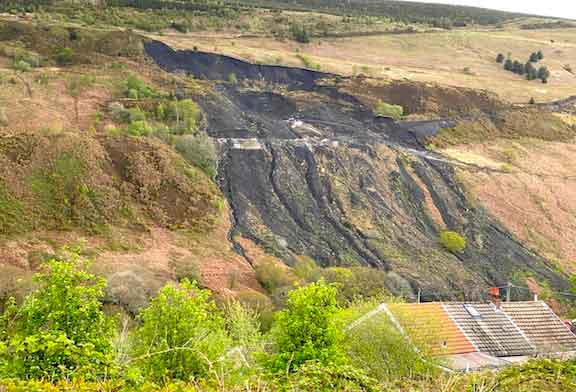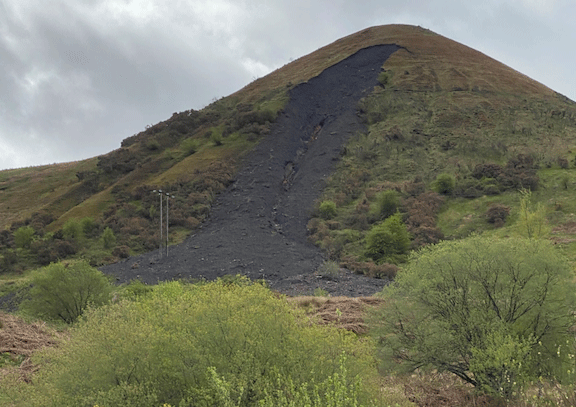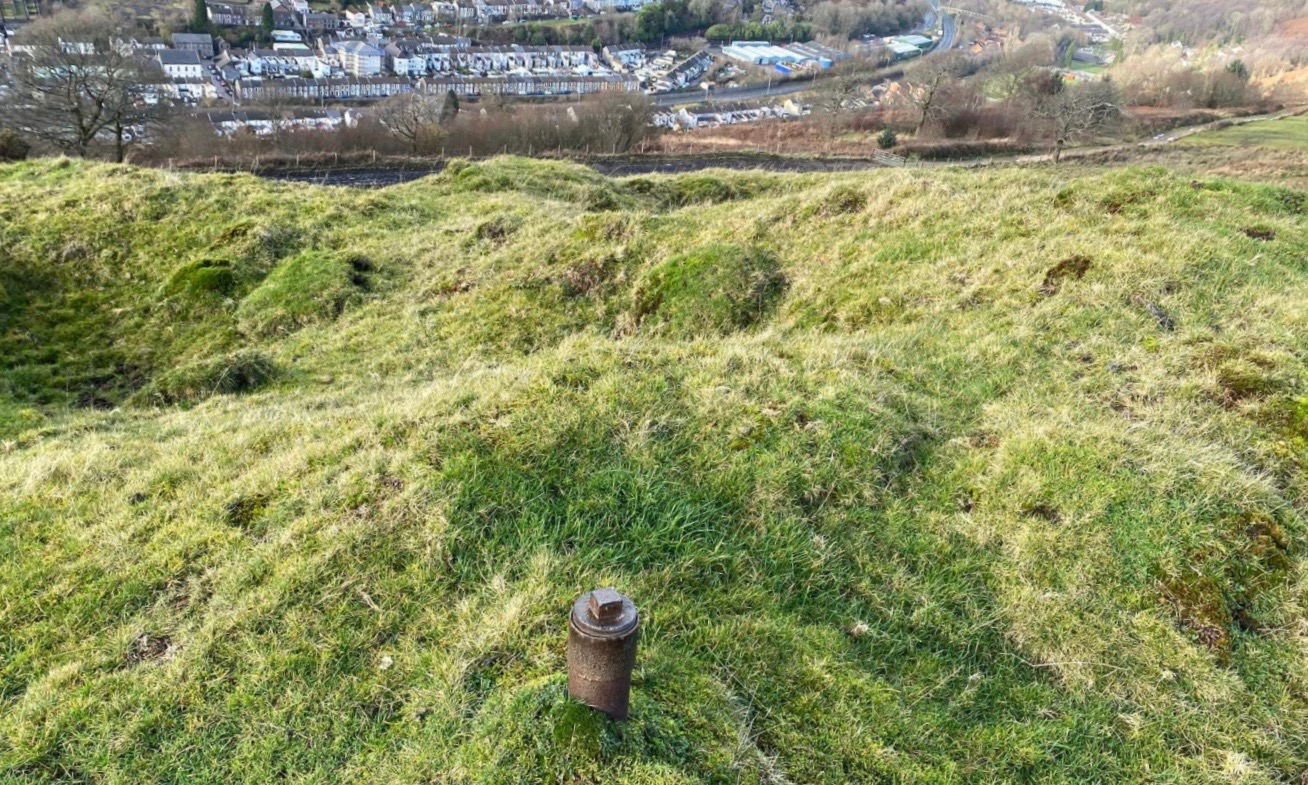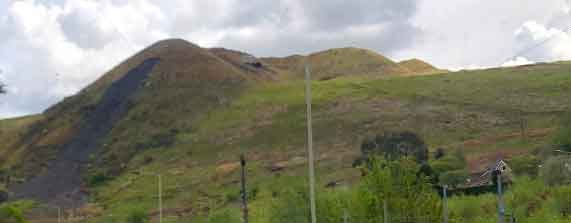Not in the public interest to inform locations of dangerous coal tips that remain a legacy left by the National Coal Board in our valleys

The Aberfan disaster was the collapse of a National Coal Board spoil tip near the village of Aberfan on the morning of 21 October 1966. A spoil tip is a pile of waste rock and soil removed during coal mining.
A tribunal tasked with investigating the Aberfan disaster published its findings on August 3, 1967. Over the course of 76 days, the panel had interviewed 136 witnesses and examined 300 exhibits. Based on this evidence, the tribunal concluded that the sole party responsible for the tragedy was the National Coal Board.
The Coal Authority was commissioned to undertake urgent ground inspections of coal tips in Wales, identifying any urgent works and the risk status of each tip.
Below Aberfan Disaster House of Commons debate on 26th October 1967.
Before I come to action taken on receipt of the Report, I should like to say a word or two about action taken during, and even before, the sittings of the Tribunal. Immediately after the disaster the National Coal Board ordered an inspection of all tips, active or disused, in the Board’s ownership and my right hon. Friend, the Minister of Housing and Local Government and I invited local authorities in England and Wales, invoking the assistance of the National Coal Board as necessary, to arrange for an inspection of all tips in private ownership. These measures disclosed potential instability in several tips and appropriate precautions were taken and remedial action put in hand at once.
The incidents which occurred during the heavy rains of last week, however, although relatively minor in character, demonstrated that some tips can still present problems and that much remains to be done. As hon. Members will hear from my right hon. Friend who hopes to wind up this debate, the efforts of the National Coal Board, the Government, and all concerned, are being directed to ensure that all problems, both large and small, can be foreseen and promptly dealt with.
One of the results of the disaster at Aberfan was to give a new stimulus also to the effort to clear up the land left derelict by industrial processes of the past, a problem of which everyone has long been uncomfortably aware, especially in the mining valleys of South Wales. The objective of this effort is not only to reclaim land now useless so that it may be available for industry or housing or other beneficial use, but also to make these areas more attractive to incoming industry and for those who live in them. To pursue this objective more effectively, shortly after the disaster I set up in the Welsh Office in Cardiff a Derelict Land Unit to work closely with the local authorities in preparing schemes of rehabilitation and getting them carried out.
Full text on the link https://www.theyworkforyou.com/debates/?id=1967-10-26a.1909.0
Apparently, there is still a list of the 294 ‘high-risk category’ tips in South Wales and the Welsh Government through Natural Resources Wales instructed the Coal Authority to inspect. We are informed there are 1,200 spoil tips local authorities and the Coal Authority and Natural Resources Wales monitor these. More than 60-colliery spoil heaps are categorised as being the most at risk. Rhondda Cynon Taf has the most at risk tips, with 30, Merthyr has 18, Caerphilly 13, Bridgend 7, Blaenau Gwent three and Neath one.
As well as landslides another major problem is pollutants associated with discharges from coal spoil heaps are acidity, iron, manganese, aluminium and sulphate. Mine and spoil heap drainage is a persistent form of contamination, with discharges remaining polluted for centuries or even millennia.
The first round of tip inspections was completed in July 2020. The second round of inspections of high-risk tips was due to finish in February 2021. The Coal Authority has supported Local Authorities by undertaking some of the inspections on these high-risk tips. The inspections have identified the maintenance requirements and the timescales within which they need to be completed. In a small number of cases, the inspections have highlighted works, which are immediately required to ensure the tip is being maintained at a standard necessary to enable routine monitoring. In these cases, the Welsh Government has urged Local Authorities to carry out the necessary works without delay.
A task force established by the Welsh Government to review coal tip safety has concluded that the current legislation “is neither sufficiently robust nor fit for purpose” for inspection or maintenance. The long-term remediation program is likely to run for up to 10 years and will require a comprehensive funding package.
The question local residents should be asking after the Aberfan disaster was no lessons learnt by all authorities responsible including the devolved Welsh Government if they had acted to remove all coal tips we would not be in this position today. Now with so many unstable coal tips still causing problems in Rhondda Cynon Taf and throughout South Wales so why the concealment why the secrecy by Rhondda Cynon Taf Council? Is better for the public to be well informed of the potential danger in their area? There is a danger with the risk of 30 most at risk coal tips in RCT alone and the danger has been known about since the 1960s.
A public-spirited resident who is trying with his Internet presence “Clear South Wales’ Coal Tips” just a local resident putting questions to Rhondda Cynon Taf Council under the Freedom of information Act and Environmental Information Regulations Act but as usual the council who you voted in to look after your best interests refuse to provide the information. The council applies the Public Interest Test; the public interest in maintaining the exception outweighs the public interest in disclosing the information.
The second round of inspections of high-risk tips was due to finish in February 2021 so why is the council withholding this public information? Is the council not accountable to the people who voted them in pay their wages and pensions through council tax?
It would seem the council does as it likes ignoring the public just like the refusal for a public inquiry into the flooding in Rhondda Cynon Taf and also knowing about unstable dangerous coal tips in Rhondda Cynon Taf is not in the public interest?





